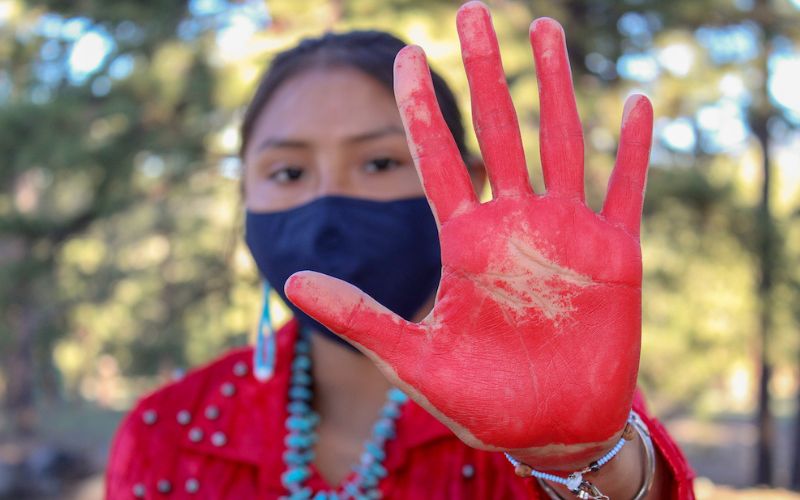
- Details
- By Native News Online Staff
Red Shawl Day, observed annually on November 19, is a day dedicated to honoring the lives of Missing and Murdered Indigenous Women, Girls, and Two-Spirit People (MMIWG2S).
Recognized annually during Native American Heritage Month, this day shines a light on the ongoing crisis of violence affecting Indigenous communities across North America.
The red shawl represents the strength, resilience, and voices of Indigenous women and serves as a visible reminder of the lives lost. Advocates wear red to signify the need for awareness and action, with the color symbolizing lifeblood and calling attention to the stolen sisters who can no longer speak for themselves.
Indigenous women experience violence at disproportionately high rates compared to other demographics. According to the National Institute of Justice, more than 84% of Native women have experienced violence in their lifetimes, and Indigenous women are ten times more likely to be murdered than the national average.
Historical and ongoing colonial violence, systemic racism, and jurisdictional complexities contribute to these alarming numbers. Indigenous communities often lack adequate law enforcement resources, and overlapping jurisdictions between tribal, state, and federal authorities create challenges in pursuing justice for victims.
Red Shawl Day amplifies the voices of grassroots organizations, families, and advocates working tirelessly to address the MMIWG2S crisis. Events such as this, educational panels, and marches are held across the country to honor victims and bring attention to the systemic changes needed.
Many of these efforts are led by Indigenous organizations, including the National Indigenous Women’s Resource Center (NIWRC), Sovereign Bodies Institute, and Missing and Murdered Indigenous Women USA.
In addition to advocacy, many Tribes play a vital role in the healing process. Ceremonies, songs, and prayers bring these communities together to honor the memory of loved ones while fostering resilience and unity together.
Everyone is encouraged to participate in Red Shawl Day by wearing red, attending events, and learning more about the root causes of the MMIWG2S crisis. Supporting legislation that prioritizes Indigenous safety and justice, such as Savanna’s Act and the Not Invisible Act, is another way to contribute to systemic change.
In addition, individuals and organizations use Red Shawl Day as an opportunity to educate others about the crisis. Social media campaigns encourage the use of hashtags like #RedShawlDay and #MMIWG2S to spread awareness and inspire action.
More Stories Like This
Native News Weekly (August 25, 2024): D.C. BriefsScope Narrowed, Report Withheld: Questions Mount Over Michigan Boarding School Study
Zuni Youth Enrichment Project Announces Family Engagement Night and Spring Break Youth Programming
Next on Native Bidaské: Leonard Peltier Reflects on His First Year After Prison
Deb Haaland Rolls Out Affordability Agenda in Albuquerque
Help us defend tribal sovereignty.
At Native News Online, our mission is rooted in telling the stories that strengthen sovereignty and uplift Indigenous voices — not just at year’s end, but every single day.
Because of your generosity last year, we were able to keep our reporters on the ground in tribal communities, at national gatherings and in the halls of Congress — covering the issues that matter most to Indian Country: sovereignty, culture, education, health and economic opportunity.
That support sustained us through a tough year in 2025. Now, as we look to the year ahead, we need your help right now to ensure warrior journalism remains strong — reporting that defends tribal sovereignty, amplifies Native truth, and holds power accountable.
 The stakes couldn't be higher. Your support keeps Native voices heard, Native stories told and Native sovereignty defended.
The stakes couldn't be higher. Your support keeps Native voices heard, Native stories told and Native sovereignty defended.
Stand with Warrior Journalism today.
Levi Rickert (Potawatomi), Editor & Publisher


